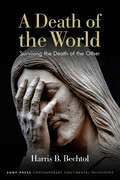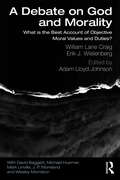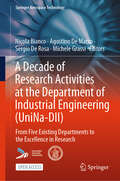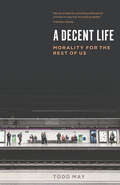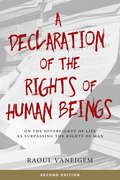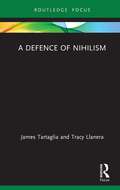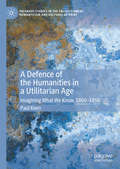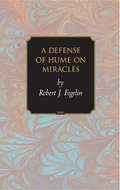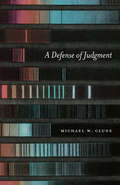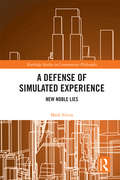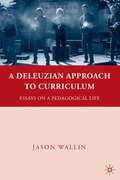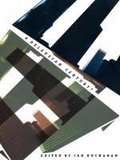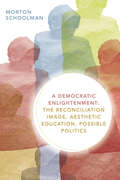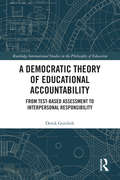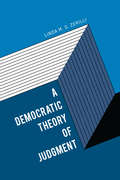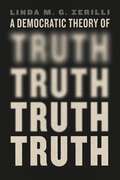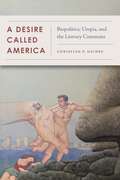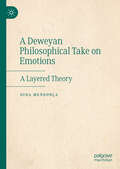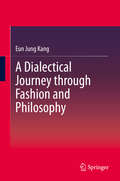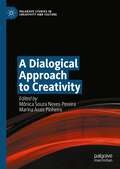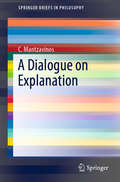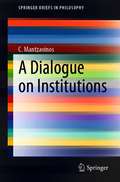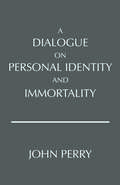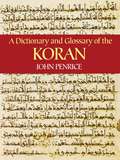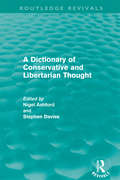- Table View
- List View
A Death of the World: Surviving the Death of the Other (SUNY series in Contemporary Continental Philosophy)
by Harris B. BechtolOffers a description of what happens to survivors after a death, based on the effect this death has on the survivor's relation to the spatial and temporal world occupied after the loss of the deceased.A Death of the World offers a phenomenological description of what happens to the world for those who survive the death of someone. Bringing Jacques Derrida's works into conversation with the philosophies of Martin Heidegger, Emmanuel Levinas, Jean-Luc Marion, Maurice Blanchot, and Claude Romano; the poetry and literature of Paul Celan, W. H. Auden, Emily Dickinson, Ovid, and Jonathan Safran Foer; and psychological works concerning trauma, mourning, epigenetics, and memory, author Harris B. Bechtol provides interdisciplinary language for understanding the death of the other as an event. He argues that such death must be understood as an event because this death is more than just the loss of the other who has died insofar as the meaning of the world to and with this other is also lost. Such loss manifests itself through the transformations of both the spaces in which meaning takes place and the lived time of a survivor's world. These transformations of the world culminate in his account of workless mourning, which establishes the contours of the life after these deaths of the world.
A Debate on God and Morality: What is the Best Account of Objective Moral Values and Duties?
by William Lane Craig Erik J. WielenbergIn 2018, William Lane Craig and Erik J. Wielenberg participated in a debate at North Carolina State University, addressing the question: "God and Morality: What is the best account of objective moral values and duties?" Craig argued that theism provides a sound foundation for objective morality whereas atheism does not. Wielenberg countered that morality can be objective even if there is no God. This book includes the full debate, as well as endnotes with extended discussions that were not included in the debate. It also includes five chapters by other philosophers who have written substantive responses to the debate - J. P. Moreland, David Baggett, Mark Linville, Wes Morriston, and Michael Huemer. The book provides crucial resources for better understanding moral realism and its dependence on, or independence from, theistic foundations. Key Features A valuable debate about whether or not God is the best explanation for objective morality, bringing together theists and atheists working on the same subject who normally are not in conversation with each other. Includes clear coverage of ontological and epistemological issues in metaethical theories, focusing on Divine Command Theory and Non-natural Robust Moral Realism. Engaging and accessible throughout, making the book well suited for undergraduate and seminary classrooms.
A Decade of Research Activities at the Department of Industrial Engineering: From Five Existing Departments to the Excellence in Research (Springer Aerospace Technology)
by Sergio De Rosa Nicola Bianco Agostino De Marco Michele GrassiThis open access book celebrates the decennial of the Department of Industrial Engineering of Università di Napoli Federico II, Italy. It covers the main research achievements developed at the department in the fields of aerospace, marine, energy, statistical, mechanical and management engineering. Five pre-existing departments merged in 2013, and the research results are here summarized to certify how important it was to join skills, expertise, and projects. The industrial engineering area is huge, but it is now dominated by the need to conceive and analyze new solutions, human and climate oriented to face with the actual challenges which dictate the new paradigm, which evolved from “is it feasible?” to “is it compatible with the environment and the human beings?”. There is still a lot to do, but the contents of this book demonstrate that the first steps have been done. All the researchers of the department have contributed to this book, more than 140 authors, and thus, it isthe collective outcome of the path they were able to perform all together, including administrative officers and technicians. It highlights the international relevance and multidisciplinarity of research at the university as well as the planned research lines for the next years.
A Decent Life: Morality for the Rest of Us
by Todd May“In lively prose, May . . . breaks down complex philosophical concepts and uses a range of everyday examples to illustrate how morality can be practical.” —Publishers WeeklyIn a world full of suffering and deprivation, it’s easy to despair—and it’s also easy to judge ourselves for not doing more. Even if we gave away everything we own and devoted ourselves to good works, it wouldn’t solve all the world’s problems. It would make them better, though. So is that what we have to do? Is anything less a moral failure? Can we lead a fundamentally decent life without taking such drastic steps?Todd May has answers. He’s not the sort of philosopher who tells us we have to be model citizens who display perfect ethics in every decision we make. He’s realistic: he understands that living up to ideals is a constant struggle. In A Decent Life, May leads readers through the traditional philosophical bases of a number of arguments about what ethics asks of us, then he develops a more reasonable and achievable way of thinking about them, one that shows us how we can use philosophical insights to participate in the complicated world around us. He explores how we should approach the many relationships in our lives—with friends, family, animals, people in need—through the use of a more forgiving, if no less fundamentally serious, moral compass. With humor, insight, and a lively and accessible style, May opens a discussion about how we can, realistically, lead the good life that we aspire to.“A meditation on how striving for decency is a route towards personal satisfaction and happiness.” —Chicago Tribune
A Declaration of the Rights of Human Beings: On the Sovereignty of Life as Surpassing the Rights of Man
by Liz Heron Raoul VaneigemSometimes playful or poetic, always provocative, Raoul Vaneigem reviews the history of bills of rights before offering his own call, with commentary, for fifty-seven rights yet to be won in a world where the “freedoms accorded to Man” are no longer merely “the freedoms accorded by man to the economy.” Readers of Vaneigem’s now-classic work The Revolution of Everyday Life, which as one of the main contributions of the Situationist International was a harbinger of May 1968 in France, will find much to savor in these pages written in the highest idiom of subversive utopianism.
A Defence of Nihilism (Routledge Focus on Philosophy)
by James Tartaglia Tracy LlaneraThis book offers a philosophical defence of nihilism. The authors argue that the concept of nihilism has been employed pejoratively by almost all philosophers and religious leaders to indicate a widespread cultural crisis of truth, meaning, or morals. Many religious believers think atheism leads to moral chaos (because it leads to nihilism), and atheists typically insist that we can make life meaningful through our own actions (thereby avoiding nihilism). In this way, both sides conflate the cosmic sense of meaning at stake with a social sense of meaning. This book charts a third course between extremist and alarmist views of nihilism. It casts doubt on the assumption that nihilism is something to fear, or a problem which human culture should overcome by way of seeking, discovering, or making meaning. In this way, the authors believe that a revised understanding of nihilism can help remove a significant barrier of misunderstanding between religious believers and atheists. A Defence of Nihilism will be of interest to scholars and students in philosophy, religion, and other disciplines who are interested in questions surrounding the meaning of life.
A Defence of the Humanities in a Utilitarian Age: Imagining What We Know, 1800-1850 (Palgrave Studies in the Enlightenment, Romanticism and Cultures of Print)
by Paul KeenThis book explores the ways that critics writing in the early nineteenth century developed arguments in favour of the humanities in the face of utilitarian pressures. Its focus reflects the ways that similar pressures today have renewed the question of how to make the case for the public value of the humanities. The good news is that in many ways, this self-reflexive challenge is precisely what the humanities have always done best: highlight the nature and the force of the narratives that have helped to define how we understand our society – its various pasts and its possible futures – and to suggest the larger contexts within which these issues must ultimately be situated.
A Defense of Hume on Miracles (Princeton Monographs in Philosophy #13)
by Robert J. FogelinSince its publication in the mid-eighteenth century, Hume's discussion of miracles has been the target of severe and often ill-tempered attacks. In this book, one of our leading historians of philosophy offers a systematic response to these attacks. Arguing that these criticisms have--from the very start--rested on misreadings, Robert Fogelin begins by providing a narrative of the way Hume's argument actually unfolds. What Hume's critics (and even some of his defenders) have failed to see is that Hume's primary argument depends on fixing the appropriate standards of evaluating testimony presented on behalf of a miracle. Given the definition of a miracle, Hume quite reasonably argues that the standards for evaluating such testimony must be extremely high. Hume then argues that, as a matter of fact, no testimony on behalf of a religious miracle has even come close to meeting the appropriate standards for acceptance. Fogelin illustrates that Hume's critics have consistently misunderstood the structure of this argument--and have saddled Hume with perfectly awful arguments not found in the text. He responds first to some early critics of Hume's argument and then to two recent critics, David Johnson and John Earman. Fogelin's goal, however, is not to "bash the bashers," but rather to show that Hume's treatment of miracles has a coherence, depth, and power that makes it still the best work on the subject.
A Defense of Judgment
by Michael W. CluneTeachers of literature make judgments about value. They tell their students which works are powerful, beautiful, surprising, strange, or insightful—and thus, which are more worthy of time and attention than others. Yet the field of literary studies has largely disavowed judgments of artistic value on the grounds that they are inevitably rooted in prejudice or entangled in problems of social status. For several decades now, professors have called their work value-neutral, simply a means for students to gain cultural, political, or historical knowledge. ?Michael W. Clune’s provocative book challenges these objections to judgment and offers a positive account of literary studies as an institution of aesthetic education. It is impossible, Clune argues, to separate judgments about literary value from the practices of interpretation and analysis that constitute any viable model of literary expertise. Clune envisions a progressive politics freed from the strictures of dogmatic equality and enlivened by education in aesthetic judgment, transcending consumer culture and market preferences. Drawing on psychological and philosophical theories of knowledge and perception, Clune advocates for the cultivation of what John Keats called “negative capability,” the capacity to place existing criteria in doubt and to discover new concepts and new values in artworks. Moving from theory to practice, Clune takes up works by Keats, Emily Dickinson, Gwendolyn Brooks, Samuel Beckett, and Thomas Bernhard, showing how close reading—the profession’s traditional key skill—harnesses judgment to open new modes of perception.
A Defense of Simulated Experience: New Noble Lies (Routledge Studies in Contemporary Philosophy)
by Mark SilcoxThis book defends an account of the positive psychological, ethical, and political value of simulated human experience. Philosophers from Plato and Augustine to Heidegger, Nozick, and Baudrillard have warned us of the dangers of living on too heavy a diet of illusion and make-believe. But contemporary cultural life provides broader, more attractive opportunities to do so than have existed at any other point in history. The gentle forms of self-deceit that such experiences require of us, and that so many have regarded as ethically unwholesome or psychologically self-destructive, can in fact serve as vital means to political reconciliation, cultural enrichment, and even (a kind of) utopia. The first half of the book provides a highly schematic definition of simulated experience and compares it with some claims about the nature of simulation made by other philosophers about what it is for one thing to be a simulation of another. The author then provides a critical survey of the views of some major authors about the value of certain specific types of simulated experience, mainly in order to point out the many puzzling inconsistencies and ambiguities that their thoughts upon the topic often exhibit. In the second half of the book, the author defends an account of the positive social value of simulated experience and compares his own position to the ideas of a number of utopian political thinkers, as well as to Plato's famous doctrine of the "noble lie." He then makes some tentative practical suggestions about how a proper appreciation of the value of simulated experience might influence public policy decisions about such matters as the justification of taxation, paternalistic "choice management," and governmental transparency. A Defense of Simulated Experience will appeal to a broad range of philosophers working in normative ethics, aesthetics, the philosophy of technology, political philosophy, and the philosophy of culture who are interested in questions about simulated experience. The book also makes a contribution to the emerging field of Game Studies.
A Deleuzian Approach to Curriculum
by Jason J. WallinThis work examines the impoverished image of life presupposed by the legacy of transcendent and representational thinking that continues to frame the limits of curricular thought. Analyzing the ways in which modern institutions colonize desire and overdetermine the life of its subject, this book draws upon the anti-Oedipal philosophy of Gilles Deleuze, revolutionary artistic practice, and an unorthodox curriculum genealogy to rethink the pedagogical project as a task of concept creation for the liberation of life and instantiation of a people yet to come. This book invites academics, artists, and graduate students to engage the contemporary struggles of curriculum theory, educational philosophy, and pedagogical practice with a new set of conceptual tools for thinking radical difference.
A Deleuzian Century?
by Ian BuchananMichel Foucault's suggestion that this century would become known as "Deleuzian" was considered by Gilles Deleuze himself to be a joke "meant to make people who like us laugh, and make everyone else livid." Whether serious or not, Foucault's prediction has had enough of an impact to raise concern about the potential "deification" of this enormously influential French philosopher. Seeking to counter such tendencies toward hagiography--not unknown, particularly since Deleuze's death--Ian Buchanan has assembled a collection of essays that constitute a critical and focused engagement with Deleuze and his work. Originally published as a special issue of South Atlantic Quarterly (Summer 1997), this volume includes essays from some of the most prominent American, Australian, British, and French scholars and translators of Deleuze's writing. These essays, ranging from film, television, art, and literature to philosophy, psychoanalysis, geology, and cultural studies, reflect the broad interests of Deleuze himself. Providing both an introduction and critique of Deleuze, this volume will engage those readers interested in literary and cultural theory, philosophy, and the future of those areas of study in which Deleuze worked.Contributors. Ronald Bogue, Ian Buchanan, André Pierre Colombat, Tom Conley, Manuel DeLanda, Tessa Dwyer, Jerry Aline Flieger, Eugene Holland, Fredric Jameson, Jean-Clet Martin, John Mullarkey, D. N. Rodowick, Horst Ruthrof, Charles J. Stivale
A Democratic Enlightenment: The Reconciliation Image, Aesthetic Education, Possible Politics
by Morton SchoolmanIn A Democratic Enlightenment Morton Schoolman proposes aesthetic education through film as a way to redress the political violence inflicted on difference that society constructs as its racialized, gendered, Semitic, and sexualized other. Drawing on Voltaire, Diderot, and Schiller, Schoolman reconstructs the genealogical history of what he calls the reconciliation image—a visual model of a democratic ideal of reconciliation he then theorizes through Whitman's prose and poetry and Adorno's aesthetic theory. Analyzing The Help (2011) and Gentleman's Agreement (1947), Schoolman shows how film produces a more advanced image of reconciliation than those originally created by modernist artworks. Each film depicts violence toward racial and ethnic difference while also displaying a reconciliation image that aesthetically educates the public about how the violence of constructing difference as otherness can be overcome. Mounting a democratic enlightenment, the reconciliation image in film illuminates a possible politics for challenging the rise of nationalism's violence toward differences in all their diversity.
A Democratic Theory of Educational Accountability: From Test-Based Assessment to Interpersonal Responsibility (Routledge International Studies in the Philosophy of Education)
by Derek GottliebThis insightful text offers a detailed account of the historical development of educational accountability in the US public education system. In doing so, it diagnoses the unforeseen consequences arising from a centralized, technocratic implementation of the concept, and calls for a radical re-thinking in how our democratic responsibilities translate into the provision, measurement, and conceptualization of education. Drawing from the works of scholars including Stanley Cavell, Linda Zerilli, Daniel Koretz, and James Scott, A Democratic Theory of Educational Accountability illustrates the way in which "educational accountability" has foregrounded centralized measures of "success" to the point of perversity. Through nuanced political theory and philosophical arguments, the text demonstrates how test-based measures have rendered the holistic aims of education futile, resulting in an education system of "box-checking" and "rule-following". Ultimately calling for a new imagination of how our democratic responsibilities are enacted in schools and communities, Gottlieb illustrates how accountability can be used for good, to ensure that our schools nurture talent, cultivate social mobility, and engage with local needs. This text will be of great interest to graduate and postgraduate students, researchers, academics, and libraries in the field of philosophy of education, educational policy, assessment & testing and democratic theory.
A Democratic Theory of Judgment
by Linda M.G. ZerilliIn this sweeping look at political and philosophical history, Linda M. G. Zerilli unpacks the tightly woven core of Hannah Arendt’s unfinished work on a tenacious modern problem: how to judge critically in the wake of the collapse of inherited criteria of judgment. Engaging a remarkable breadth of thinkers, including Ludwig Wittgenstein, Leo Strauss, Immanuel Kant, Frederick Douglass, John Rawls, Jürgen Habermas, Martha Nussbaum, and many others, Zerilli clears a hopeful path between an untenable universalism and a cultural relativism that forever defers the possibility of judging at all. Zerilli deftly outlines the limitations of existing debates, both those that concern themselves with the impossibility of judging across cultures and those that try to find transcendental, rational values to anchor judgment. Looking at Kant through the lens of Arendt, Zerilli develops the notion of a public conception of truth, and from there she explores relativism, historicism, and universalism as they shape feminist approaches to judgment. Following Arendt even further, Zerilli arrives at a hopeful new pathway—seeing the collapse of philosophical criteria for judgment not as a problem but a way to practice judgment anew as a world-building activity of democratic citizens. The result is an astonishing theoretical argument that travels through—and goes beyond—some of the most important political thought of the modern period.
A Democratic Theory of Truth
by Linda M. ZerilliA critique of the concept of truth presupposed by the post-truth debate—and a bold new vision for a more pluralistic citizenry. We say that we live in a “post-truth” era because disinformation threatens our confidence in the existence of a shared public world. Affirming objective truth may, therefore, seem necessary to save democracy. According to political theorist Linda M. G. Zerilli, such affirmation can stifle political debate and silence dissent. In fact, Zerilli argues that the unqualified insistence on objective truth is as dangerous for democracy as denying it. Drawing on Arendt, Foucault, and Wittgenstein, A Democratic Theory of Truth challenges the concept of truth presupposed by the post-truth debate. It argues that we, the people, have an essential role in discovering and evaluating any truth relevant to the political realm. The result is a striking defense of plurality, dissent, and opinion in contemporary democratic societies.
A Desire Called America: Biopolitics, Utopia, and the Literary Commons
by Christian HainesCritics of American exceptionalism usually view it as a destructive force eroding the radical energies of social movements and aesthetic practices. In A Desire Called America, Christian P. Haines confronts a troubling paradox: Some of the most provocative political projects in the United States are remarkably invested in American exceptionalism. Riding a strange current of U.S. literature that draws on American exceptionalism only to overturn it in the name of utopian desire, Haines reveals a tradition of viewing the United States as a unique and exemplary political model while rejecting exceptionalism’s commitments to nationalism, capitalism, and individualism. Through Walt Whitman, Emily Dickinson, William S. Burroughs, and Thomas Pynchon, Haines brings to light a radically different version of the American dream—one in which political subjects value an organization of social life that includes democratic self-governance, egalitarian cooperation, and communal property.A Desire Called America brings utopian studies and the critical discourse of biopolitics to bear upon each other, suggesting that utopia might be less another place than our best hope for confronting authoritarianism, neoliberalism, and a resurgent exclusionary nationalism.
A Deweyan Philosophical Take on Emotions: A Layered Theory
by Dina MendonçaThis book puts forward a layered theory of emotions, which argues that emotional processes are best understood as occurrences that happen within complex emotional situational scenarios that integrate different and interconnected layers. According to this theory, there is an underlying logic of emotions which is more akin to a creative endeavor than to a fixed and mechanical structure. The book is divided in three parts. The first part provides the Deweyan historical background and shows how it gives rise to the hypothetical suggestion of the Layered Theory of Emotions. After laying down the Layered Theory of Emotions, the following chapters show how Dewey’s philosophical work grounds the theoretical suggestion. The second part of the book presents various insights that spring from the proposed theory. Among other things, it will show the importance of some new distinctions, such as meta-emotions and emotional depth, and provide a different understanding of previous emotional categories, such emotional intentionality and emotional habits. Finally, the third part of the book concludes by drawing some consequences of the layered theory of emotions for philosophy of mind, and for the general philosophical task. The book hopes to raise thought provoking questions and point out possible future research directions to deepen Dewey’s insightful scholarship, and Emotion Theory.
A Dialectical Journey through Fashion and Philosophy
by Eun Jung KangThis book takes an in-depth look at the integration of fashion and philosophy. It challenges the deeply rooted prejudice or misconception that fashion is a field limited to body-oriented and appearance-related themes and practices. It also reveals that fashion is intermeshed with distinctively modern issues that belong to the realm of the mind as well as the body. In doing so, it refashions philosophy and philosophizes fashion, which ultimately amount to the same thing. The book argues that while the philosophization of fashion can give a clearer understanding of some esoteric areas of philosophy and fashion’s close connection to modern societies and politics, it also shows that philosophy can assist in redeeming fashion from the objective, bodily world, positioning it as an indispensable part of the humanities. This is because fashion manifests critical aspects of human culture in our time, and is an expression of the zeitgeist, which is interwoven with the unfolding of history. This book will be highly relevant to students and researchers in fashion studies who are looking for the theoretical underpinnings and insights for their own work. It will also be of keen interest to scholars in the field of philosophy who are seeking to apply philosophical concepts to both everyday life and our empirical world.
A Dialogical Approach to Creativity (Palgrave Studies in Creativity and Culture)
by Marina Assis Pinheiro Mônica Souza Neves-PereiraThis book takes an epistemological and theoretical stance in investigating the phenomenon of creativity and its processes. Creativity is analyzed through the lens of cultural psychology, in which psychological processes emerge over the course of life, and can only be understood in relation to the subject’s history and life experiences. Dialogism is presented as central for the constitutive dynamics of the developing subject and the emergence of creative actions through the expression of human agency. The authors highlight Bakhtinian dialogism and its developments in the scientific field of psychology and related areas to shed new light on creativity and its processes. The authors argue this will enable a better understanding of creativity in its development and emergence, and its impact on individuals and society.
A Dialogue on Explanation (SpringerBriefs in Philosophy)
by Chrysostomos MantzavinosThis book introduces a panorama of the philosophical theory of explanation. Written as a philosophical dialogue between two interlocutors, Philip and a student, it presents a defense of the position of explanatory pluralism. The fictional dialogue takes place on Cape Sounion, near Athens, where the two interlocutors are enjoying the view over the Aegean Sea. An initial exchange of arguments leads to a dialogue unfolding the development of the contemporary philosophical theory of explanation. The second part of the dialogue is devoted to an exchange of arguments on explanatory pluralism as a novel approach to the philosophical theory of explanation. The two also discuss historical cases as well as the ways of achieving explanatory progress in science. We are all philosophers and we develop our own philosophy by exchanging views and arguments. The dialogue form is and should remain the principal form of philosophizing, since ideas do not merely exist – they develop. This is certainly the case in real-world philosophical interaction, and as this book aptly demonstrates, it can also be the case in written philosophical exposition.
A Dialogue on Institutions (SpringerBriefs in Philosophy)
by C. MantzavinosThis book consists of a dialogue between two interlocutors, Pablo and a student, who discuss a great range of issues in social philosophy and political theory, and in particular, the emergence, working properties and economic effects of institutions. It uses the dialogical form to make philosophy more accessible, but also to show how ideas develop through intellectual interaction. The fact that one of the interlocutors is the "student" in a place in the real world makes the dialogue quasi-fictive in character and enables the active engagement of the reader. After all, we are all philosophers and we develop our own philosophy by exchanging views and arguments. The dialogue form is and should remain the principal form of philosophizing, since ideas, like butterflies, do not merely exist – they develop. This is certainly the case in actual philosophical interaction, and it can be the case in written philosophical exposition. Although the dialogue does not presuppose prior acquaintance with the respective philosophical and social scientific literature under discussion in this book, it makes arguments more accessible, and conveys the feeling that there are no definite solutions to philosophical problems.
A Dialogue on Personal Identity and Immortality
by John PerryPerry's excellent dialogue makes a complicated topic stimulating and accessible without any sacrifice of scholarly accuracy or thoroughness. Professionals will appreciate the work's command of the issues and depth of argument, while students will find that it excites interest and imagination. --David M. Rosenthal, CUNY, Lehman College
A Dictionary and Glossary of the Koran
by John PenriceIt is every Muslim's duty to read the Koran and try to understand it, which can be a problematic task for those unacquainted with Arabic. The study and appreciation of Arabic literature likewise demands a thorough familiarity with the Koran; the majority of works by Muslim writers abound in allusions to its precepts and quotations from its pages. The sacred text's purity of style and elegance of diction make it the standard of Arabic.This classic guide to one of the world's most widely read books permits everyone, Muslim and non-Muslim alike, to understand the Koran -- even those with no prior knowledge of Arabic. Geared toward beginners, it was written to answer the need for an American version of the Koran in contemporary English. Each word is listed under its verbal root, grouping words without roots alphabetically, and numerous explanations of the text appear throughout to help beginners master some inevitable difficulties and to assist more advanced readers of Arabic in solving problems.
A Dictionary of Conservative and Libertarian Thought (Routledge Revivals)
by Stephen Davies Nigel AshfordFirst published in 1991, this is a reissue of the path-breaking Dictionary of Conservative and Libertarian Thought, the first book to examine the ideals and arguments produced by the intellectual traditions of both conservatism and classical liberalism. Covering the ideas of many such distinguished thinkers as Hayek, Scruton, Friedman and Buchanan, the volume provides a valuable survey of the historical development of both schools of thought in all of the major western countries and their contributions to contemporary debates. From American Conservatism to French Liberalism, Invisible Hand to Organic Society, from Scientism to Scepticism and Utopianism to Voluntarism, this is a vital work whose reissue will be welcomed as much by the keen layperson as by students of political science, the history of philosophy, economics and public policy.
